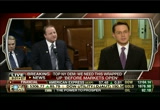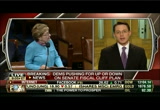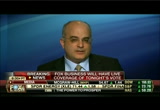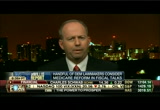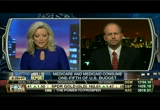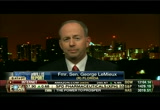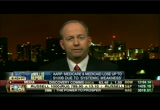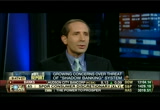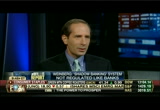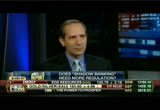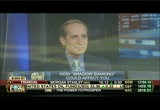tv The Willis Report FOX Business January 1, 2013 9:00pm-10:00pm EST
9:00 pm
and it's pretty much from as far as i a i can tell from a u.n. plan is for it. i don't get it. >> my message goes across the board. you have to cross the same bridge everyday whether you are republican or democrat. neil: but it doesn't hurt you signing up to the xt pixar movie were undertaking. >> i hope th just don't watch the show. neil: that will do it, thank you for watching. be prosperous and safe and be loved. goodnight.
9:01 pm
diane: happy new year. i'm diane macedo join the live from fox business headquarters in new york, and we've been keeping you updated all night as we read for the house of representatives to vote on a fiscal cliff deal that the senate passed earlier this morning. now, after determining there wasn't enough support to amend the bill and send it back to the senate, it does appear house members will issue an upper down vote on this before u.s. markets open tomorrow looking overseas, austria is open for business and markets are up about 1% at the moment. japan is closed for the holidays, some numbers from their today, but whale is also up slightly at the moment . we have rich edson live from capitol hill keeping us updated my montae. the top democrat on the house rules committee said it's important to wrap this up before the trading day begins, but for all the negatives about the fiscal glove, it's at least expected to reduce the deficit.
9:02 pm
the cbo says the senator would make the deficit worse by about 4 trillion of for the next ten years. rich: absolutely, and many look at that deficit number it's important to remember that it involves a lot of spending and tax cuts and tax reductions that congress does at the end of every year anyway. so when congress has a deficit score, as it's called for a particular proposal it assumes that all the tax rates refer to the clinton era tax rates and that millions of americans that normally don't pay the alternative minimum tax would pay the amt and that doctors who treat medicare patients would automatically get a major pay cut beginning at the year. all that is basically spending and tax cuts that congress does at the end of every year anyway. that deficit number, while it is striking, it's basically what
9:03 pm
the can present to from the congressional budget office assumes congress will do every year. they just can't by law say that will happen because it's not in law. we don't do much long-term was bank. when you said that congresswoman louise slaughter is hoping to get this done before markets over, there will be a vote before markets opened. we may be getting a vote before the end of the day. baboon that's the time we expect the house will vote on this proposal. the senate-passed proposal. if the house can pass this, that means it goes to the president's desk for his signature and then we move on to the debt ceiling fight. there was some congressional trauma going down a few hours ago, this after congressional republicans looked at the steel and said, there aren't enough spending cuts in here. started tough, perhaps, think about voting on an amendment that would cut some $300 billion in government spending, when
9:04 pm
republicans started asking members hominy folks would support that knowing that if they change this proposal, even adding spending cuts on, it basically on does the deal that the senate reached in pretty much were back at square one. the temperature of the house republicans, they decided it's not something that enough of them could support. they decided just to vote on the senate-passed bill which will happen in the 11:00 hour. when you look at what the republicans have done, there is a sense of growing momentum of support. this printer you want to find plenty wrong with this. democrats feel the same way. your starting this see signals that enough of these folks could maybe get around to supporting this that it might pass. not a definite, but this is what will happen between 11591145. that's why we'll watch it. diane: we've been here before, the whole idea of dealing with tax increases now and spending cuts later. the last time we took that route
9:05 pm
spending cuts never came. do we have any guarantee this time around that they will, in fact, deal with spending cuts? rich: absolutely no guarantee. the only guarantee you have is republicans are still sticking to their pledge that any amount that you raise the deficit ceiling you must take that amount and kept them from government spending. thus their opening offer. we know is about 200 billion left in deficit spending that the federal government can do before we actually do exceed the debt ceiling, not sure how much time that will last. in the past treasury says you get about two months were 200 billion, but it's very tough to nail down, partially because we don't know what our tax-and-spend policy will be because this bill has passed congress at. if this does pass we will have probably a little firmer guidance from the treasury department about how much we can expect before we honestly hit that deadline, august 2nd
9:06 pm
2011, raising the debt ceiling beyond. here we are again. diane: another one of those things constantly being temporarily passed. we don't have to keep going through this. rich: that's one of the pieces. this would permanently take care of that, and so it's one of these budget things that never went to its way into long-term budgeting for it, but congress would be honest about it and just go head. the other thing the republicans are starting to look at here is now the tax rates have all reverted to clinton error rates, it happened at midnight this morning or last night, they would be voting to attacks hit that amounts to nearly $4 trillion from current tax rates. and so that's something republicans have been talking about as a positive in all this, that if they don't fall for this there would actually be voting against the tax cut. there is bending the they don't like. it all like the one year
9:07 pm
extension of unemployment benefits. what we are getting here is in a sense extending 99 percent of the bush era tax cuts permanently which is something of a lot of democrats we don't like. diane: it sounds like everyone is going to have to make some sacrifices on one side or the other. we will continue to keep everybody posted. rich edson live from capitol hill. thank you for being here. everybody, as i said, we will continue to keep you updated. that's the latest. we will be back at 10:00 p.m. will break-in at any time as we give more news. also, don't forget, fox business will be live tomorrow morning at 5:00 a.m. for special coverage as the markets open here in the u.s. and start reacting to all of this. >> reporter: co2 emissions. when you look at countries around the world, australia, new zealand, huge backlash in ontario, we're seeing backlash against the large
9:08 pm
wind projects going in all over the place. gerri: talkbout new york. you have an interesting example there. >> just last month lawyers here in new york filed lawsuits, 60 residents in herkimer county, just north of albany, they filed lawsuit saying these project, wind turbines, built within 1000 feet or so of residences are emitting all the noise, keeping them up at night, diminishing property values and th filed suit. i think it is indicative of the backlash. gerri: this is interesting. you say this is the first time it will be heard in court of law, the issue about the sound. >> in the u.s., yes. gerri: seems to me that is pollution. >> sure it is. that is the part, exposes the double-standard, gerri. it just drives me crazy. where is the sier club? where is greenpeace, natural resources defense council, so-called environmental groups, why aren't they stainedding up for the small landowners? these peop are really getting a raw deal and the wind energy companies of course are making handsome profits but these individual
9:09 pm
landowners are getting the short end of the stick. >> i wouldn't be happy if one of those set up next to me. >> you certainly would not. gerri: let me ask you about something called the energy strategy council. >> right. gerri: they're suggesti starting a national energy strategy council. >> sure. gerri: would come up with a policy, soup-to-nuts, every federal agency gets involved. possible? >> sure it is possible. this is the federal government after all but, what bothers me is that there are, this idea that we'll have a quadrennial review, a 4-year plan just like the pentagon. i don't know that is the best model to work on. gerri: i have to ask you about b today. >> sure. gerri: because there's big news coming from bp. the federal government says you're disqualified from winning new contracts. here's bp statement. suspension that is due to bp's lack of business integrity as dep straighted by the company's conduct with regard to the deepwater horizon blowout explosion, oil ill and response.
9:10 pm
now thetock did not really get hit today. what is your estimate what this means? >> i think it will be a temporary move. i think the obama administration again is wanting to show, hold up bp, that we're punishing them this is enormous company. it is one of the biggest oil and gas producers in the u.s.. gerri: doesn't it matter if it loses contracts from the u.s.? >> ty have a lot of contracts already. so those contracts don't go away. there is enonly on new contracts. it is important but i think is a temporary deal. gerri: robert, you must come back and sit on the set again. always a pleasure. >> always happy to be here, gerri. gerri: sti ahead tonight, a mountain of new regulations coming our way next year thanks to congress. we'll break it down. president obama promised to end crony capitalis. how is he doing? we'll have a report card.
9:14 pm
a tsunami of new regulations on the way. a study finds new regulation still under review by the obama administration could cost $106 billion before the end of the year. the biggest culprits? the epa and the energy department. here to explain the director of regulation policy for the american action for. sam, welcome. i want to start with this $106 billion number we were talking about in the break. this is a lot of money. so $106 billion. these are rules that are still being written that were supposed to go into place sometime this year. this as the laws not already on the books, this is at is coming. tell us about that. >> correct. for example, there are 25 economically significant regulation at the white house now, that is regulations with a economic impact of $100 million or more. some are rules under the affordable care act, menu labeling rules, rules for vending machines, labeling requirements. so there is a lot at the
9:15 pm
white house now. there is lot of rules that are passed their statutory deadline. past the deadline for the administration set for them, that have been waiting around for several months. we don't know why. you can assume might be because of the election because the pace we're on right now is significantly lower than other re-election years. for example, 2008, 2004, and 2000. gerri: you say more than 80% of the rules have been under review for 90 plus days. why does it take so long? look, i don't even want to see the rules come into place but at end of the day they should have some efficiency about enacting them and writing them down? >> sure. well the biggest issue is transparency. you mentioned the 90-day threshold. under execuve orders, 90 days is supposed to be the maximum. rougy 80% of the rules have been there longer than 90 days. this is really unprecedented. part of the issue as i mentioned is transparency the white house under law is supposed to release two unified agendas of regulations each year and the last one they issued was forast fall.
9:16 pm
even that one was late. we don't have one for 2012 at all. we have no clue really beyond what is at the white house what is scheduled for 2013 and 2014. members of theouse oversight committee --. gerri: talk about your tranarency problem. that is a big transparency problem. we were showing our viewers over your shoulder a list of regs coming. some include epa boiler rules which will put significant burden with people who own factories and buildings everywhere. this is something people are really worried about. what is potential cost of something like that. >> sure. several billions of dollars. that bill has been in and out of the regulatory process. they tried to finalize it last year. it has been kick around the courts. surprisingly enough it received blowback from even moderate senators. for example, two senators from maine are very worried about the boiler regulation. it has been at the white house for a while as well. and, it is just a matter of time. they will not hold onto the
9:17 pm
rules forever. likely they will be released this winter or sometime in the spring. gerri: we've got final rules for labeling requirements under obamacare. we've got, what i think is the farm dust rule, particulate matter rule. is that farm dust? >> well, epa stress that farmers don't have to worry about the rule and, if you look compared to the other rus it is sort of seems like a drop in the bucket of $69 million. according to epa's projections only a few counties that wouldn't be compliant. there are other rules. for example, the cooling water standards rule that would regulate power plants and how they use cooling water during the electric generaon process. so the department of energy and epa are really busy, have a lot of rules that have been at the white house longer than the 0 days. gerri: no kidding. you have another interesting number. you say 19,000 employees are devoted to red tape. tell me about that. >> sure. if you look at the aggregate paperwork compliance burden of all the rules there is
9:18 pm
roughly 37 million hours. that 37 million hours, take productive work year roughly, 2,000 work hours, divide by 37 million. roughly 19,000 full-time equivalent employees. in theory those are solely dedicated to red tape compliance. rri: sam, quickly what type of grade would you give the obama administration as transparency. >> he is supposed to publish two unified agendas. the white house has not published any and given no reason why they haven't published any. we're still clueless why they're not obeying the regulatory flexibility act. gerri: no clue but i guess transparency is in the eye of the beholder. sam, thanks for your time. thank you for having me. gerri: we'll be right back droid dna augmentation initiated. vision expanding to a 5-inch 1080p hd display and camera.
9:19 pm
9:20 pm
9:22 pm
gerri: electric cars, remember the dream? that's the president's dream. listen to this. >> we can break our dependence on oil with biofuels and become the first country to have a million electric vehicles on the road by 2015. [applause] gerri: kumbaya. a million electric cars on the road by 2015. save the planet. save the gas. wait, somebody forgot to tell consumers. despite tax credits of up to $7500 to buy the models, just 18,000, just 18,000 were sold in 2011. boy, at that rate we'll have a million green cars on the road by, 2067. or 55 years from now.
9:23 pm
incredible. where di we go wrong? it's easy. government government involved. the feds are no good at picking what technologies regular americans are gog to glom on to. did the department of energy create amazon.com so people would save gas driving to the mall? no, they did not. did thpost office invent skype so people could get in touch more inexpensively? no, they did not. breakthrough products invented by private companies. let's stick to cars since that's where we started. model t, 104 years ago the nation's first touring vehicle was first produced on an assembly line. henry ford said his car was fothe great multitude and how 16.5 million model-ts were eventually sold. 16 1/2. how about the biggest selling american made vehicle ever, ford f-series, trucks. amazing 35 million of those were sold since the trucks were introduced way back in 1948 and it is ranked as the
9:24 pm
number one selling vehicle in the u.s. for 24 years. and now, you can trick them out just like a sedan with tv screens, high-tech sound systems, even back seats. but none of this, none of this required a ta benefit to boost sales. that is the problem. when government starts tinkering, alining its priorities with the private ctor, you get the chevy volt, fannie mae, freddie mac, all disasters, all costing the taxpayer. for more on this on crony capitalism, i'm joined by tim carney, senior political columnist by the "washington examiner" author of book, obama-mics and how barack obama is bankrupting you and enriching his are corporate friends, wall street lobbyists. this is the perfect guest for this siggment. thanks for coming in. appreciate you being here. what can we look forward to in the next four years do you think when it comes to crony capitalism? >> barack obama will be pro-business in his own way, which is also
9:25 pm
pro-government. in other words he will be subsidizing industries he wants to succeed, regulating in a way that protects the biggest businesses in some industries and making sure that people don't make profits in ways that he doesn't want to succeed. you will see a lot more green energy stuff you saw in the stimulus bill and that he tried to push forward in his climate change bill. he will generally see a lot of guys who hire the best lobbyists will get ahead because they will get the sort of big government favors that happen when vernment involves itself more and more in private industry. gerri: you know, i find that nobody, nobody is more relentless in pursuing taxpayer dollars that they have access to them than the companies, than capitalists. because they put their entire business model around this idea of getting the free money. >> yep. gerri: they are relentless in their pursuit. you've been studying this for a long time. do you agree? >> yes. and so the problem is in a free market economy when people try to pursue profit, what they're trying to do is produce something that
9:26 pm
people actually want to buy. but once government starts to get involved you get companies like general electric who say, well, the best investment we can make investing lots of money in lobbyists or employ a thousand people in the tax division to game. go, game regulations. suddenly profit is not a catch to producing something of value but it is attached to gaming government, gaming regulations, tax code and handouts. and that sul of sudden where you get liberals think capitalism always is, profit doesn't involve trying t deliver something when you want but gaming the system. gerri: smart stuff, tim. thanks for coming on. you have got to come back soon. >> i sure will. gerri: when we come back should entitlement reforms be on the table in washington? the latest on medicare, next. you know how painful heartburn can be. for fast, long lasting relief, use doctor recommended gaviscon®. only gaviscon® forms a protective barrier that helps
9:27 pm
9:30 pm
gerri: a ticking timebomb inside the federal budget putting taxpayers on the hook for billions of dollars in defaults. at student loans, that is what i'm talking about, escalating intoou nosebleed territory with delinquencies rates at a new all-time high outstripping any other consumer debt. our student loans the new subprime loan? joining now, spokesman for the young american foundation. thank you for joining us. we really appreciate your time. the president is talking about higher education and how it should be an economic imperative. sten to this. >> a higher education is no longer a luxury. it is an economic imperative in the 21st century. it is part of what we nee to succeed in this global economy. and i'm going to fight for every young person is willing to work hard to get an education.
9:31 pm
gerri: should everyone hava college degree? >> if i was the president, i thk you might has well said let me be clear. every student should start with 30,000 dollars of debt and maybe a bankruptcy. it's absolely asinine. the currt system we have in place is nothing short of immoral. we are putting students that it is economically imperative for them to get an education, but then we are putting them in that situatn a situation was. not only are there no jobs, starting with 30,000 dollars of debt is not a way to start your life. gerri: let's get marked in him. i'm going to give you more time. we would like to get more time. mark, is it asinine to these kids start their lives with so much debt and give it to everybody? >> well, college benefits -- the students who h have college degrees earn 70 to 80% modents e degrees earn 70 to 80% more. the federal government gets
9:32 pm
twice as much federal income revenue from someone with a college read this one without. it is an investment of book the future of the individual in the country. gerri: okay, what do you think? >> revenue? are you kidding me? you think they would be going to college without this program? that's asinine and not true. saying that you cannot raise tuition as much in two years. having futures go up, while you better your product and make it worthwhile in a portable. it is not that way right now. it's hurting my generation. i get to be on tv, but guess what? i'm still struggling to pay my loans because of the system. gerri: all right, we will let mark getting it. this is an interesting point. there are no controls. where are the controls?
9:33 pm
gerri: s that any way to treat our taxpayer dollars? >> the federal government school is to enable access college education. we have twice as many people in college now visited several decades ago. the problem is that the government is not focused on the possibilities. but the government needs to do is make their own limits contingent upon what the next generation will do in regards to payingack the debt or not. >> government picking winners and losers -- would you ever get a loan to someone who could not get back? no, you ouldn't. if iwas a private investor, they could help the students and measure whether or not whether they are getting something that is worth something. the government can't do that. i don't think it's fair either. that is why it has to be a private thing. the only thing that is fairer.
9:34 pm
gerri: mark coming into this questio what would have been a college education -- the system in this country -- it's all public dollars were pulled out. >> welcome you have a glass of higher education. you have only the wealthy going to college. you would have of the college is failing. the private sector is not willing to fund loans to every student. they are no more capable of choosing how to fund loans appropriately than the federal government. just look at what happened in 2008. we went from 16 to two dozen. >> but it is being subsidized by the governmnt. gerri: you make the point that the public sector should be completely out. mark says they can't do that because there would be no college education. he responded that? >> marks in two minutes ago that
9:35 pm
the sector is profitable and brings the government money by lending it out. i think the private sector can turn something up profitable and that way higher education can't run roughshod over my generation gerri: the last word, mark? >> well, what we need to do is rece the shift from government investment where they have been reducing the grants on a per capita basis and invest more in in the grants. >> more grantsmore money. batna. trillion dollars worth of student loans. great idea. gerri: all right, you agree to gerri: all right, you agree to disagree
9:36 pm
9:39 pm
gerri: medicare. the largest expenditure in the federal budget, our country's debt problems deepening by the day but many democrats fail to acknowledge elephant in the room. our next guest says there's a lot of tough talk and little action on that front. i recently sat down with former republican senator of florida. >> you don't reform the way we pay out medicare, to be one of the things that breaks the bank and makes us unable to mt our obligations, so we absolutely have to reformat and the legislation i wrote back in 2010 that we passed with bipartisan support signed by the president went o after something everybody is against, and that is fraud. gerri: let's get to that in a
9:40 pm
second, but i want to spend one more second on this idea, democrats from illinois saying on tv he would like to see $400 billion in entitlement cuts. defense and interest. the ones grown the most are medicare and medicaid. we have to do something to stop the increase in the amot or it will swallow the rest of the budget. continuing to run these huge deficits. gerri: it will take over our budget, the only thing we pay for. as you pointed out, the services found we can't even get the front portion of this right. this is a topic you're very interested in. we're trying to find fraud and found 20 million in overpayment.
9:41 pm
what is wrong with the system here? >> it is the bureaucrats implementing what is a good law. what we did was follow the credit card industry does. many of your viewers have had transactions on the credit card for the credit card company called and said there is a fraud alert on your card, did you really do that transaction? that is computer modeling looking at your spending habits and sees if they're in the normal course of your spending and if they are not, the computer puts up the red flag and they check with you and if you say no, they don't pay. but to something working in the private sector, $2 trillion credit card business paying very little in fraud, stop the fraud and let's apply that to medicare. between medicare and medicaid there was $100 billion of health care fraud. unfortunately the bureaucrats in washington haven't implemented correctly, gave up the contracts
9:42 pm
to two companies who don't have any experience in this area, and we believe in outside groups at the time we could stop up to 20 early in dollars per year in fraud by implementing this law that was passed in the correct way. unfortunately it is not being done. gerri: it is astonishing to me how many ways you can map this up. and yet president obama said he is working very hard at stopping fraud, here's e president. >> we went after medical fraud in medicar and medicaid very aggressively, more aggressively than ever befor $50 billion of waste taking out of the system. gerri: the white house done a good job of this? >> the heaven, unfortunately. i'm not sure this president even knows what is happening. the $50 billion number, don't know what he gets that number from. the government accounting office has said that they stop $7000 in
9:43 pm
overpayment. $7000 in overpayment after spending tens of millions of dollars to implement this incorrectly. where i live in south florida, where the health care fraud capital of the country. we have prosecutors doing a good job blocking these people up who have stolen million sometimes tens of millions of dollars, but we don't get the money back. stop the fraud before it starts. gerri: senator, how does it do that? >> somebody orders 100 wheelchairs in an hour. the couter will say that it's out of t normal course. the red flag goes up. it has to happennd whic then whs not happening now, the provider sends for reimbursement, the payment can't be made until the red flag is checked out. that is what the credit card companies do. this isn't rocket science.
9:44 pm
when the red flag goes up, don't pay until you verify. we will save tens of billions of dollars and put more money back and medicare, which will make it more solvent. gerri: goodness sakes, you are suggesting we adopt private sector ideas to the public sector system? ththank you for coming on, a pleasure to talk to you. you have got to come back soon. >> thank you so much, enjoyed beg on. gerri: thank you. coming up and we go to the l.a. auto show and show you the hottest trends of all things cars. and looking ahead to 2013 at the next threat to the financial system. when nobody is talking about it. we will next.
9:48 pm
gerri: it is called the shadowdo banking system, hedge fund, money market fund, any lender typically not aw st bank and bld by many for the global financial crisis. they're bigger than ever at $67 trillion in termshe of asses according to an report from the financial stabilityrd board. i asked editor-in-chief ofnanc american banker about the risks it poses to the total financial system. >> essays on the financial to system, these were peoe who were in the business of lendinge money, of investing that are not regulated li a lot of banks so nobody really knows what they're doing.th it is sort of a block box.with gerri: we have no idea they're
9:49 pm
maintaining any kind of standards we expect out of the bank banks are highly regulated entities. >> they can get in trouble as well. they have regulators worth watching closely and a lot of the shadow banks don't. if you'r youhedge fund were laey regulated. y be and you have things like money market fundshich we saw with the real problem for small investors because the primary reserve fund went under. it created a panic. and created a panic. gerri: one of the big concerns out there, $67 trillion globally and the u.s. leads the way. how big is that, how big a problem could it be? >> when you think there lightly regulated and in the united states, the shadow banks have assets of half as much as the banks. they don't live in a world that is separate from banks and other pieces of the economy so if they
9:50 pm
get into trouble you have counterparty risk. if i owe you money and get in trouble it is your problem as well. it is closely intertwined. we saw this in 1998 with long-term capital management. no one had ever heard of it and this hedge fund got into trouble and it was dmed by w wall street and the federal reserve to pose a systemic risk to the whole financial system so we never heard of it but had to bail out. gerri: do we need more regulation? that is the first in a lot of people wouldld say? >> first thing regulators want to do is regulate and they want a lot of complicated regulation. i don't think that is the answer but bringing this stuff out into the sunlight making these shadow banks show what sort of risks are opposed to the system would be a really good start so at least we have a ense of what is going on. gerri: for the regular american out there there's a whole world that is completely closed to them, has nothing to do with them but at the end of the day
9:51 pm
could make big trouble for regular investors. give us an example of how this could unwind. >> as we saw with money-market funds which was for mom-and-pop investors but what you had was something people thought was safe and stable and as it turned out when one of these funds started to get into ouble there was a risk that the whole industry, $2.5 trillion industry could suddenly have a huge run on its money, there would be a lot of other financial institutions in trble so it could have three knockoff affects. it could have a systemic effect, it could mean your government has to bail amount which year taxpayer money and one of your investments is in trouble. gerri: i hate to get when a taxpayer money. >> thank you. heahadto the l.a. auto show. is green still a trend? find out next.
9:53 pm
9:55 pm
gerri: world'stests gerri: the world's hottest cars are taking the stage for the 2012 los angeles auto show. automakers unvei unveiling near0 new vehicles. including world first from chrysler, ford, gm, bmw andswag volkswagen. a sneak peak before friday's public debut, consumer reports is live in los angeles with the very latest. you here. such a fun segmentment tell me, first, what trends are you seeing out there? mething that might be newr different that people can expect coming up. >> sure. the l.a. show, you see a lot of electric cars, fuel efficient cars. there are e electric cars, but we're seeing a lot of normal cars getting more and more fuel efficient. everything's more fuel efficient and keeping the function.
9:56 pm
gerri: you said utility is a big thing. what do you mean by that? >> utility, i mean, you know, people think you get a fuel first time car, it's a little tiny box that crries two people, and they are cramped in like a sart car, something li that, but ford here, they hav a seven passenger vehicle over 30 miles per gallon, looking at suvs that can do things, carry things, and still get great fuel economy. gerri: working through the makes and models that you really like here. you want to start with the tesla. >> sure. it looks to be an amazing screak. ww have not purchased one or tested it, but i have driven it, it's a ridiculous vehicle. it's so fast, so roomy. feels like you are driving a ferarri with room for five. it's really more fuel efficient than a prius. gerri: didn't tesla have trouble
9:57 pm
in the past and "consumer reports" having trouble test the cars in the past? i'm surprised you're so excited. >> well, no, no, it's not. people get different electric car makers mixed up. that's a crime. there's fisker and tesla, totally different companies. just because one has problems, doesn't an the other is going to. they supply technology to toyota for electric vehicles. it's a proven company that has a record, my, on t other hand, just building this one feck, and it's really, seems to be riddled with proble. gerri: all right. talk about the audi a7. i love the audis. >> it's a wonderful car, drives great, nicely finished inside, and, you know, here's what blew us away we look at t reliability information,nd we have a reliability information from 1.2 million vehicles saying what went wrong with the cars, and audi is reliab.
9:58 pm
that floored us. traditionally they have a lot of issues, but not anymore. they are up there with the japanese. gerri: interesting. what about hyundai velociter. impressive name. i wonderrhow much time they spent thinking that name up. >> it has nothing to do with the dinosaur it's based on. it's quick, fun little car. what's intriguing is it's a sub compact, a cheap little fuel first time car, but looks sporty and drives sporty too. it fitses four people well. you can have it do everything sometimes right. gerri: okay. what about t scion? >> ha-ha! i'm six-foot tall. the frs, one of my favorites, again, fun, tossble, back to the basics car. it's a gift to car enthusiast. gerri: luxury cars up 10% this
9:59 pm
year, recession, maybe not, speaking to the economy. jake, thanks for coming on tonight. great to have you on. >> you're welcome. fun being on. have a great night. green cars seem to be all the rage at the car shows every year, but they are not catching on with consumers despite president obama's dream of a million electric vehicles on the road by 2012, and 2011, only only 18,000 units sold, that's a bummer. in tonight's top five, the best selling electric cars in the u.s. so far this year, number five, ford focus electric. now, through august of this year, ford sold fewer than 200 of the vehicles. they didn't reach the lots until may. four, the mts bee shy, sales up 400% to a whopping 403 cars. knee san, number one sellas
139 Views
IN COLLECTIONS
FOX Business Television Archive
Television Archive  Television Archive News Search Service
Television Archive News Search Service 
Uploaded by TV Archive on

 Live Music Archive
Live Music Archive Librivox Free Audio
Librivox Free Audio Metropolitan Museum
Metropolitan Museum Cleveland Museum of Art
Cleveland Museum of Art Internet Arcade
Internet Arcade Console Living Room
Console Living Room Books to Borrow
Books to Borrow Open Library
Open Library TV News
TV News Understanding 9/11
Understanding 9/11


